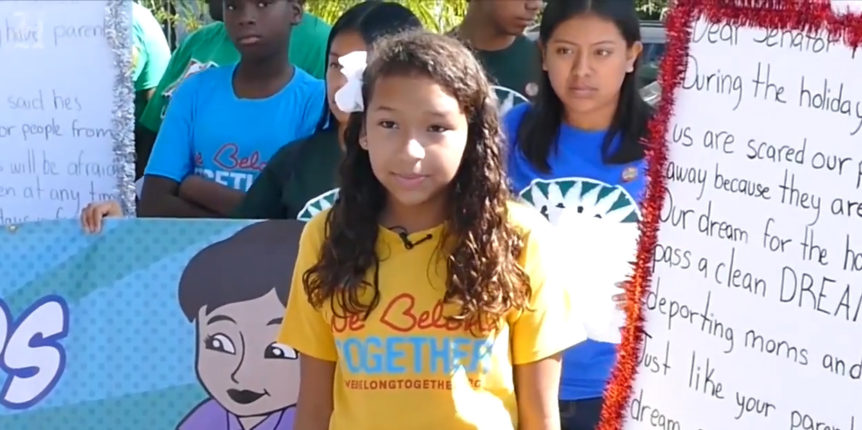Just before Christmas of 2015, Leah Cayasso came home with more than 50 letters for children who were being held at U.S. shelters for immigrants after crossing the Mexico-U.S. border.
A few days earlier, Leah’s mother, a Honduran immigrant, had asked her then 10-year-old daughter to write just one letter to a child in custody. But Leah thought the idea was so important that she recruited her school friends to write dozens more of the Christmas greetings.
In her letter, Leah encouraged the children detained by immigration authorities to stay strong and “REMEMBER THAT GOD LOVES YOU” — all in upper case.
That project encouraged Leah to fight for a community that she considers to be vulnerable — immigrants. Today, she’s an activist involved with the “We Belong Together” campaign. Over the summer, she delivered a speech before nearly 30,000 people in Washington. And in the upcoming school year, she will be the face of a national school leadership campaign.
Leah Cayasso portrait designed by Rommy Torrico for the ‘We The Future’ campaign.
A poster with Leah’s face and the words “Families Belong Together” will be displayed in schools around the country as part of the “We The Future” campaign. Leah, who is now 13, is the youngest of the 10 young activists featured in the campaign. Beside the poster, they each created a class plan for teachers on the issues that interest each of them.
The class plan, as outlined by Leah, urges students to write letters and focuses on helping people understand the complicated issue of immigration, which has increasingly made headlines across the nation since the 2016 elections.
Three years after Leah and her schoolmates sent letters to children and teenagers in U.S. custody after crossing the Mexican border alone — as part of an exodus that stretched from 2013 to 2015 — the government currently holds a record 14,000 minors in immigrant shelters around the country
“I wanted to help because my friend Melanie was one of those girls, and later she had the opportunity to be free,” Leah said recently, recounting her first steps into activism. “That taught me that no matter your age, you can always give something to help others. It doesn’t have to be money. It can be time, love, our voice.”
Family separations after crossing the border, plans to build a wall and the deaths of Jakelin Caal and Félix Gómez Alonzo — the Guatemalan children who arrived with their parents and died in Border Patrol custody in two separate cases — were among the immigration issues that made headlines in 2018.
But at the community level, young people like Leah and organizations like the Florida Immigrant Coalition, Catholic Legal Services and Americans for Immigrant Justice have spoken out against policies they view as hostile to immigrants and provided legal assistance to both recent and more settled immigrants.
CATHOLIC LEGAL SERVICES
For Randy McGrorty, executive director of Catholic Legal Services (CLS) for the Archdiocese of Miami, his work with immigrants reflects the best part of what it means to be a U.S. citizen.
“Personally, I feel that the work we do represents the best of the American tradition,” McGrorty said. “And I believe that the reason America is great is precisely because of the generations of immigrants who have come to the United States and contributed so much.”
He added that his organization works daily with immigrant families that have been separated “in one way or another.” For example, CLS this year helped Venezuelans who landed at the Miami International Airport with valid tourist visas but were detained by immigration authorities because of suspicion that they intended to remain permanently. The organization also has represented dozens of men and women who are facing deportation but have children born in the United States.
“Many of them are our neighbors, longtime friends or relatives who are members of this community and contribute to the economy,” said McGrorty.
But he added that organizations like CLS now face increasing difficulties even as they face up to 50 percent increases in requests for their services, and the cases are growing increasingly difficult to win.
“There have been changes in policy that changed the law without a Congressional decision, which makes the evidentiary process in (immigration) cases more difficult,” he said. “We have more scared people calling us, fewer resources and more financial needs.”
DEFENDING MINORS
Similar challenges face Americans for Immigrant Justice (AIJ), where its lawyers started noticing almost a year ago that their clients were increasingly younger. The non-profit represents minors held in shelters in Florida after they were separated from their parents at the border or crossed alone into the United States.
One of the AIJ lawyers represents a three-year-old Guatemalan girl whose father was deported and whose mother died in Guatemala.
AIJ also helps thousands of immigrants in Florida to navigate the complex U.S. Immigration system.
But changes in immigration policies have forced AIJ to reorganize its strategies, said executive director Cheryl Little.
“From the thousands of cases we have, we’re prioritizing those that need immediate attention to protect their rights, but with fewer resources every day,” said Little. “Now we accompany every person that we represent when they have to go to the ICE (U.S. Immigration and Customs Enforcement) office, something that they used to be able to do alone before because they were not a priority for deportation.”
Despite the new challenges, immigration activists and officials of legal aid organizations insist that they remain committed to their work.
“Obviously, this is not the time to give up,” said Little. “We’re working more and more hours to give people a chance.”
Read via Miami Herald.

